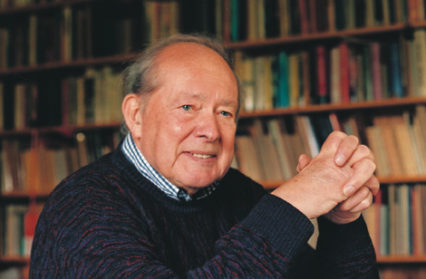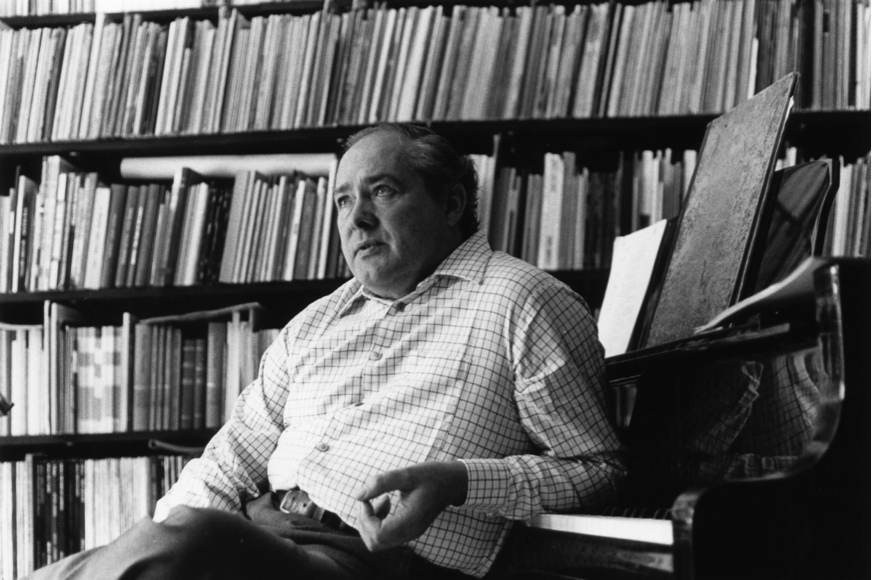To mark the 88th birthday of the great Alun Hoddinott, who died 10 years ago, award-winning composer Christopher Painter pays tribute to his friend and mentor.
On March 11th 2008 the brightest light in Welsh music was dimmed with the passing, after a long and difficult illness, of Alun Hoddinott.
I had the great privilege and pleasure of knowing Alun for over 27 years as his pupil, copyist, publisher, and, most importantly, friend. He was a kind, gentle, generous man with an intellect of which I was in awe. He had a heart as big as a house and truly was, in Peter Pears’ words “a Father Christmas of a man.
I first encountered Alun’s music via a set of recordings in the music library at my school and, having expressed a liking for his music, my music teacher, the wonderful and inspiring Walter White of Ystradgynlais, suggested that I should apply to Cardiff University. His words – “Alun Hoddinott is there and he’ll be good for you” – bore more importance than both of us realised and have shaped the rest of my life.
I initially met Alun on my very first day at University (actually my second day as I was so keen I had arrived a day early) when all new students had an interview with “the Prof.” Having waited my turn, I finally found myself in the same room as Alun and his presence filled it. We went through the formalities with Alun telling me who my tutors would be, how the course was structured and so on. He then asked me what I thought I might specialise in during my second and third years as an undergraduate. When I nervously spluttered “Composition” he looked up, asked me if I was sure and when I replied in the affirmative he said “Good” and the interview ended.
Undergraduate life at Cardiff was exciting and varied with, in addition to academic studies, a concentration upon practical music making. Students were encouraged to form their own ensembles and to organise concerts and this was a fantastic atmosphere for composers. I remember when, as Secretary of the students’ Contemporary Music Society, I approached Alun with the idea of organising the first concert of works by student composers to be wholly organised and performed by students. He threw his full support behind the idea and not only made the concert hall available to us for an evening concert but also arranged for a recording to be made (invaluable for composers) and he and Rhiannon sat through what must have been an interminable concert as we squeezed in as much music as possible.
At Cardiff during that time, emphasis was placed on producing rounded musicians with academic classes being supplemented by courses in acoustics, aural training, keyboard harmony, languages and practical studies. I well remember having my second-year interview with Alun when he told me that I would be allowed to specialise in composition and that my tutor would be Richard Elfyn Jones (another great teacher albeit with a totally different approach to that of Alun). Alun concluded the interview by referring to my performance in the keyboard skills examination – “You know, of course, that Keyboard Studies are compulsory for undergraduates?” he said solemnly with a stern look on his face. His face lightened and, with the twinkle in his eye that I was to see many times again, he continued “In view of your marks this year I am putting you down for singing instead!” I later found out that I had achieved 17 out of 100 and this was only because the examiners had felt sorry for me!
The new Music Department at University College, Cardiff (now the Cardiff University School of Music), designed by Welsh architect Sir Alex Gordon and opened in 1971 by the Duke of Edinburgh, was very much Alun’s baby and his influence pervaded every aspect of life there.
As a student, one took for granted the collection of modern art, on public display, from artists such as Barbara Hepworth (her bronze, “Walk In” stands outside the main entrance), Eric Malthouse, John Piper (a personal friend of Alun) and Will Roberts all of which added to the feeling of creativity and vibrant thought within the department. It is only now that I fully appreciate just how fortunate we were to be able to absorb this every day, almost by osmosis, and to be inspired by it.
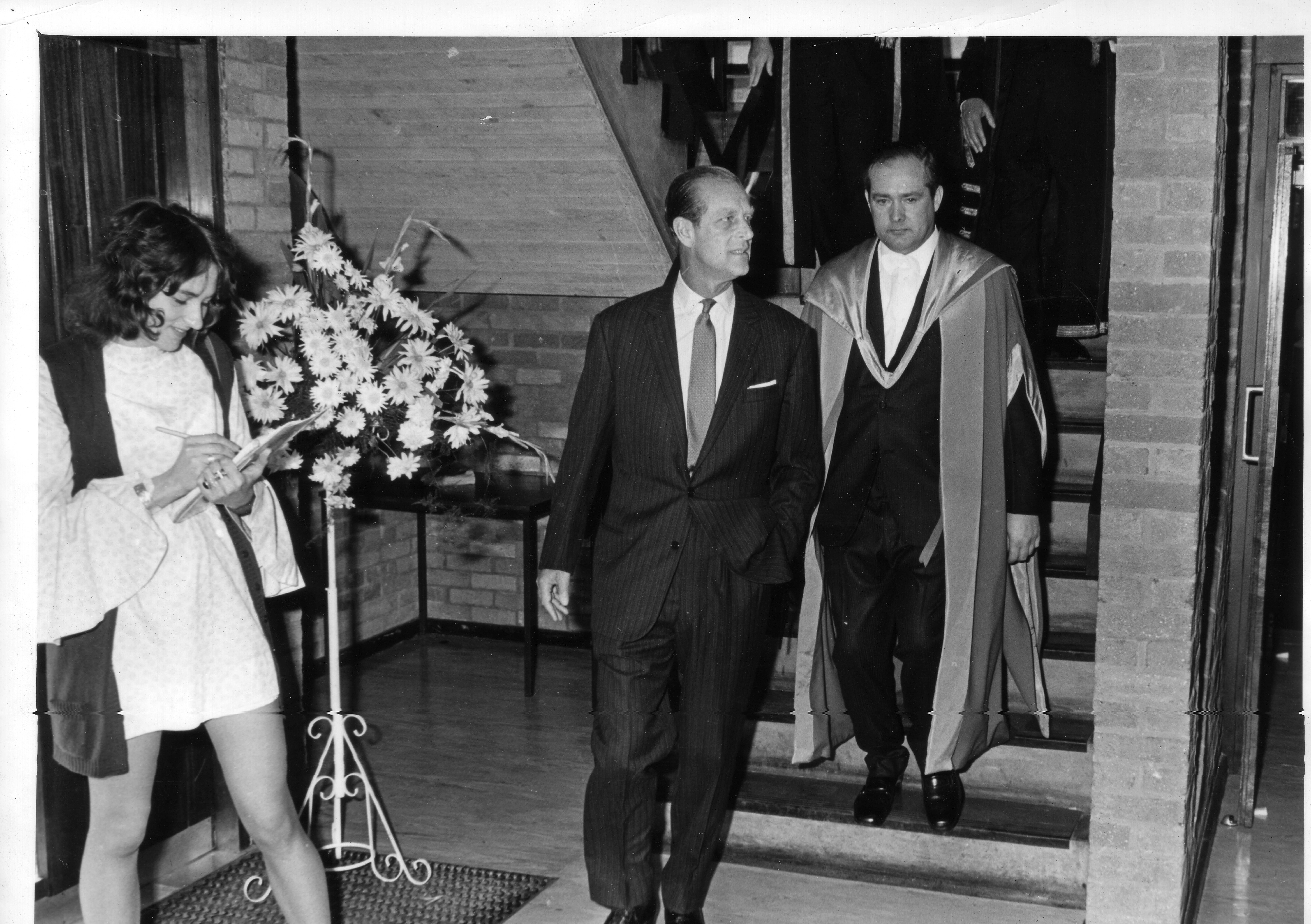
During the 1980’s the UCC Music Department was not only the largest in Europe but was also considered to be the leading one amongst British universities. It was consistently in the top five European music departments and we should be grateful that Alun’s loyalty to Wales had prevented him from accepting the offered professorships at both Cambridge and Manchester.
After completing my degree I was accepted to study for an M.Mus, specialising in composition. The main part of this course involved one-to-one composition tutorials and, much to my amazement and joy, Alun decided to tutor me himself. Studying with Alun was a tremendous adventure; his teaching style was gentle and nurturing mixed with relevant anecdotes and much humour. I loved my private time with Alun and tutorial days were the highlight of my week.
Alun was a very generous teacher – with his time, his support and his possessions. Alun would regularly refer me to a composer or work which he felt I should study and this would be followed by copies of scores and/or recordings from his own collection. It was during this time that I received my first professional commission, an overture for the Cardiff Festival, another example of Alun’s generosity and support towards his students.
After completing my examination, I discovered the outcome one day when Alun passed me in the corridor. “Congratulations, you’ve passed,” he said as if the result had never been in doubt, “next week we start on your PhD – that’s when the REAL work begins.”
PhD studies with Alun were intense and, with no specified course to follow, incredibly rewarding. Once again, Alun was very generous with his time and support. A consummate orchestrator, he might spend a session just discussing one small aspect of instrumentation until we both felt we had it just right. Another time it might be the dissection of my harmony down to the bare skeleton to expose the outline of my harmonic plan.
There was never a bad piece as far as Alun was concerned, simply ones that could be improved. If I could explain what I had tried to accomplish then that was good enough; the biggest mistake was not to know why I had done something. Invariably, Alun would then come up with a much more succinct way of achieving the intended result whilst giving the impression that I must have known this all along and had simply preferred to tackle the problem in another way. In this manner, Alun was continually building up my confidence and encouraging me to explore different styles and techniques. He once said to me that in his opinion there was no such thing as a bad composer, just ones who stopped trying.
As part of the course, I was to submit a supporting thesis on my chosen subject of Britten’s song-cycles. Alun arranged for me to meet with Peter Pears but, sadly, Pears passed away before the meeting could take place. I did, however, get to spend time at the Red House (now home of the Britten-Pears Foundation) and Snape Maltings. Following this, Alun suggested that I should have a series of consultations with the Britten scholar, Dr John Evans (a distinguished Cardiff graduate) who was then Head of Opera at the BBC in London. Both my tuition fees and travel expenses to London were paid and it was only much later, through a third party, that I discovered that when the university authorities had refused to pay for these consultations, Alun had paid for them himself – he never spoke of it to me, another example of the man’s generosity.
In 1999, I was Composer-in-Residence with the National Youth Orchestra of Wales and was commissioned by them to write a work in honour of Alun’s seventieth birthday. He had been a founder member of this, the world’s first national youth orchestra and had written several works for them in the intervening years. Even though he had just undergone a debilitating and painful operation due to his diabetes and could hardly walk as a result (and Rhiannon was suffering from a terrible bout of ’flu) both Alun and Rhiannon came to St. David’s Hall for the performance, knowing how important it was to me that they were there.
Alun was very much a European composer who happened to be Welsh rather than an insular Welsh composer. Although intensely proud of his Welsh identity he was open to the wider musical world and encouraged his students to be the same. As a result of his efforts, composers such as Samuel Adler (Eastman School), Marek Stachowski (Warsaw), Karlheinz Stockhausen and Robert Simpson came to Cardiff to give masterclasses to the composition students. In addition, through the Cardiff Festival, Alun brought many composers and ensembles to the department with the resulting benefits to students.
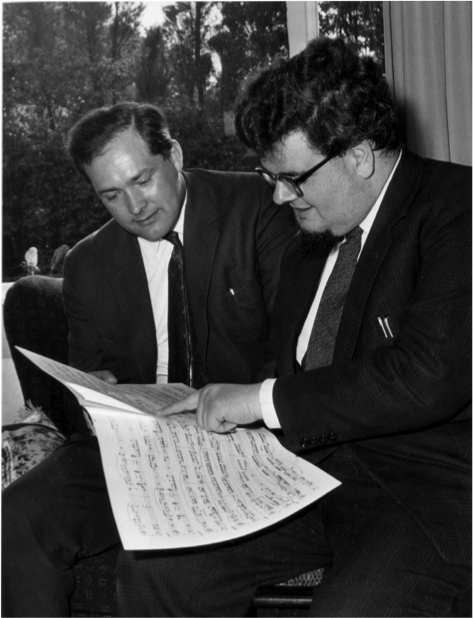
The Cardiff Festival of Contemporary Music, as it then was, was co-founded with John Ogdon in 1967 and brought, for the first time, composers such as Benjamin Britten, Olivier Messiaen, Michael Tippett and Peter Racine Fricker to South Wales. In addition, apart from involving the BBC Welsh Symphony Orchestra and the UCC students’ orchestra, the Festival brought professional ensembles, conductors and performers from all over the world to Cardiff, thus providing an intensely rewarding experience for the students at the Music Department and to the concert-going public of South Wales.
The Cardiff Festival of Music, as it was in my time and up until its sad demise, took place towards the end of the Michaelmass term in the run up to Christmas. Its rich mix of orchestral, chamber and student concerts mixed with lectures was spread – morning, noon and night – over a two-week period so that there was always something happening that was exciting and full of interest – a far cry from some of today’s meagre offerings.
The Festival widened access to the arts in general by involving arts forms other than music in its programming. As Robin Stowell has stated – “The Festival also widened public appreciation of contemporary art and sculpture through its various exhibitions, whether of works by internationally-renowned John Piper or by prominent local figures such as John Wright”
Always receptive to new ideas, Alun acted upon a suggestion of the Festival Chairman, Norman Lloyd-Edwards, that the Festival should include a Saturday morning concert for children. This was, in turn, a tremendous success – twenty years ahead of the now accepted education and outreach programmes. Alun was also very supportive of the South Glamorgan Youth Choir and their participation in the Advent Carol Concert. Indeed, in 1984, he wrote the Christmas cantata, The Bells of Paradise, for the South Glamorgan Youth Orchestra & Choir to perform at the St. David’s Hall as part of the Festival.
Alun assembled a very strong team to form the Festival Committee and with them he ran the events with a seemingly effortless precision that made the Cardiff Festival into one of the major UK music festivals. The Festival ran for over twenty years, did much to raise the profile of music, and the arts in general, in South Wales, created a vibrant cultural atmosphere in the capital and is much missed.
Alun’s approach to the Festival was very hands on – I can remember him helping me to carry timpani and move pianos – and one story told me by Rhiannon, and confirmed by Alun, perfectly illustrates this. During one Festival, Rhiannon had stayed home from a concert due to a bad cold and had gone to bed early. Later that night she heard a commotion downstairs and upon investigation discovered Alun there with the members of the orchestra who had performed that evening. It transpired that there had been a problem with their hotel booking and, there being no other solution, Alun had invited them all to stay at their house. Thus, in the early hours of the morning, Rhiannon found herself feeding a gang of hungry musicians who then went to sleep all around the house.
Alun and Rhiannon Hoddinott’s hospitality is legendary and I first experienced this whilst still a student when groups of postgraduates would be invited to lunch or dinner. To be invited to their home was a rare pleasure not just because they were generous and gracious hosts but also because Rhiannon is a superb cook and Alun was a wonderful raconteur.
From that time until the very last time I visited Alun, I couldn’t go to their home without Rhiannon providing me with either a meal or, at the very least, tea and cake. Many a happy afternoon or evening was spent discussing whatever Alun was working on, music in general or current events and listening to Alun and Rhiannon relate stories from their life together.
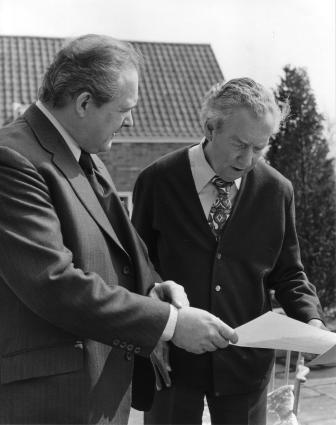
It was always fascinating to listen to Alun talk warmly of his friendship with such greats as Benjamin Britten (they had both studied with Arthur Benjamin), Ralph Vaughan Williams, Alan Rawsthorne, Humphrey Searle, Michael Tippett, William Walton, Gian Francesco Malipiero (who called him his son after Alun had found a long-lost manuscript of his), Mstislav Rostropovich, John Ogdon – the list goes on and on. These conversations would often provide fascinating insights into the lives and characters of these icons. These vignettes included the story of how, when their son Ceri was a very small boy, the Hoddinotts would visit Grace Williams in Barry for Sunday tea and how Grace would make small sandwiches for Ceri, and how she would fuss over him. Alun held Grace in high regard not just for being one of the pioneering women composers or for her prodigious talent but for, along with Daniel Jones, being the first truly internationally minded Welsh composer who had absorbed influences from outside Wales whilst developing a very personal, distinctive, style.
There were also darker reminiscences such as Humphrey Searle becoming very withdrawn following the war, haunted by his experiences as an agent in the Special Operations Executive and Alun’s great sadness at the fate of his friend John Ogdon.
Alun and Rhiannon were also, at a time when this wasn’t the norm, great travellers and the tales of their travels in Europe would make as interesting a travelogue as any. Alun was a great fan of motoring (I remember his Maserati from my time as a student) and he and Rhiannon would often drive through Europe during the vacations. The stories of their adventures are legion but included accounts of how their car had rolled down a ravine in the French Alps and they were forced to seek shelter at a monastery and how, when taking one of Alun’s academic colleagues with them to Italy, the hapless, non-Italian speaking, man had accidentally purchased a house and had to be rescued by Alun.
There were, too, many interesting and amusing stories about half a century of music in Wales and the personalities involved therein. Alun had been a founding member of the Guild for the Promotion of Welsh Music (now the Welsh Music Guild) and had served on the Executive Committee for a number of years, often acting as liaison between the Guild and the BBC Welsh Orchestra (later the BBC Welsh Symphony Orchestra and now the BBC National Orchestra of Wales). In this role he encouraged, on behalf of the Guild, the performance of works by Welsh composers and also the participation of the Orchestra in the Guild’s annual Congresses. John Edwards, the founder and driving force behind the Guild, had spotted Alun’s enormous potential at an early stage and it is fitting that not only was Alun the first recipient of the John Edwards Memorial Award but that he, along with Mervyn Burtch, was one of the first recipients of the Fellowship of the Welsh Music Guild.
Alun was a true Renaissance man with interests in art and literature coupled with an impeccable aesthetic sensibility and could speak eloquently on such a wide range of subjects that it was always a joy to be in his company. I know of no other man who, when needing to cover an unusually shaped window in his conservatory, would ask his friend, the painter Tom Nash, to produce an artwork for the spot rather than simply put up a blind.
Alun’s interests best came together in his six operas where he could marry his love of literature, drama and art. Three of these were to librettos by Myfanwy Piper, who became a lifelong friend and had also been librettist for Britten’s Death in Venice; Owen Wingrave and Turn of the Screw. Piper also selected the verses for A Contemplation Upon Flowers (1976) which was dedicated to the memory of the composer’s father and also adapted Flaubert’s text for The Legend of St. Julian, premiered by the City of London Sinfonia, conducted by Richard Hickox, at Llandaff Cathedral in 1987. There were also plans for a further operatic collaboration between Hoddinott and Piper – Le Colonel Chabert, based on an adaptation of Balzac and another, untitled, opera about the protestant martyr Rawlings White (who was executed on the site where Howells Department Store stands in Cardiff today) was planned with the Cardiff-born author, John Manchip White.
Alun had a strong affection for the works of John Piper (Myfanwy’s husband) and owned a large number of his paintings together with works by Ceri Richards and Kyffin Williams. These works were never displayed in a self-conscious “look-at-what-we’ve-got” way but were just part of the fabric of their life. The actor Vincent Price when asked “What’s it called?” about an item in his art collection, fired back, “It’s called WE LIKE IT!” – a sentiment that I’m sure Alun shared. Alun and Rhiannon’s home, whether in Lisvane or Three Crosses, reflected William Morris’s doctrine “have nothing in my house that I do not know to be useful, or believe to be beautiful” and simply exuded style and good taste.
A shy and gentle man, Alun would warm in the company of friends and hours would fly by as if they were minutes and visitors were never made to feel that they had outstayed their welcome. In Norman Lloyd Edwards’ words “He enjoyed good food and Rhiannon was a master chef for the many dinner parties they gave in their home in the course of which Alun’s sense of humour came to the fore and laughter shook the room.”
Much of Alun’s work was influenced by his love of architecture, art and literature. An avaricious reader, Alun drew inspiration from a number of diverse sources including novels, poetry and art, history and travel books. One has only to think of the more obvious examples such as Lanterne des Morts inspired by the building of that name at Sarlat in the Dordogne, The Heaventree of Stars (Ulysses – James Joyce), Noctis Equi (Dr Faustus – Christopher Marlowe), Broch Ynghod and Alun’s last orchestral work, Taliesin (both inspired by tales from the Mabinogion).
Closer to home, the Welsh landscape and nature provided a rich source of inspiration. Much has already been written about the brooding nature of Alun’s music, particularly in his trademark nocturnal writing, and this is in no small part a reaction to his physical surroundings. One clue to Alun’s “night music” may lie in a story he once told me about his violin lessons when he was a small boy. When walking to and from his lessons he would have to go through a graveyard, often in the dark, and that this had conjured up all sorts of images in his young mind.
When Alun and Rhiannon moved to Three Crosses (near to Alun’s childhood home in Gowerton) they fell in love with the Gower landscape and with that of West Wales in general. Evidence of this are the works Grongar Hill (setting the poetry of John Dyer of Aberglasney); Promontory of Dreams (setting texts about Gower by Trevor Fishlock) and Alun’s last vocal work, Towy Landscape (settings of John Dyer).
Although not necessarily integral to his work, Alun, like Messiaen, was blessed (or cursed) with colour synesthesia which links, in the brain, colour to sounds. I have no evidence that this played any part in his compositions and this might be an interesting thesis for someone to explore in the future. I do remember Alun telling me of his cataract operation and how the water washing over his eye had produced a myriad of colours which in turn had generated sounds in his mind.
I must stress at this point the importance of Rhiannon in the Hoddinott “partnership”. Composers’ wives are generally the long-suffering silent partners but Rhiannon is much, much more than this. An accomplished musician in her own right, for over fifty years Rhiannon was the rock who provided a stable environment for Alun to work in as well as providing translations and chronicling their daily life. A gracious and beautiful lady, both physically and spiritually, her importance in Alun’s life and work should never be underestimated.
Alun’s family was very important to him and his love and pride were always evident. In addition to his devotion to Rhiannon, he doted on his son Ceri and his grandchildren, Lowri and Rory. I remember him telling me that not long after they moved to Three Crosses, he handed his bank card over at the local garden centre and was asked not “are you Alun Hoddinott, the composer?” but “Mr Hoddinott, are you the father of the surgeon?” [Alun and Rhiannon’s son Ceri is a renowned consultant orthopaedic surgeon] – Alun was particularly proud of that.
*
Alun’s prodigious compositional talents are legendary and this personal memoir is not the place to examine his works in detail. However, in over twenty years of working as his copyist and publisher I have had a fascinating insight into his working practices and his thoughts on composition.
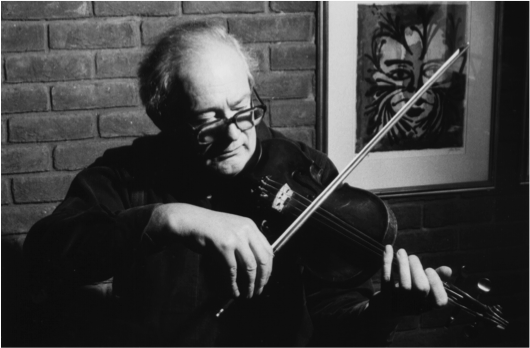
Alun was the consummate craftsman for whom the physical process of writing down the music was almost as important as the thought process and working out. He once told me that he took pleasure in deciding which pen he would use and the feel of applying the ink to the paper. When arthritis made it increasingly difficult for him work, I tried to persuade him to use a computer. I will not repeat the response but he made it abundantly clear that he would never use one and referred to Rhiannon’s computer as “that thing upstairs” although he was very happy for her to keep in touch with their friends via e-mail.
Alun had a basic routine for his work and finished his daily labours in time to have dinner with Rhiannon – a part of the day that made up for the loneliness of the composer’s work. Alun worked himself hard and I quite often found it difficult to finish typesetting the last piece before the next arrived. Work sessions consisted of discussions regarding work coming up, progress reports on the work in hand and revisions to works recently completed. As someone who has to concentrate solely upon the current work in hand, I envied his ability to talk, in depth, about several different works at the same time.
Alun’s works were always meticulously worked out with a great deal of pre-composition before the score was started. He had a high regard for form and structure and once told me of his admiration for the Sherlock Holmes stories of Conan Doyle for the meticulous way in which they were constructed. Alun had an innate sense of instrumental line which was derived from his admiration of the Italian masters which developed during his early training as a violinist. Indeed, such was his talent that he could have been a soloist had he not developed stage fright which ended all thoughts of a playing career.
In fact, Alun’s training as a string player brought him closer to the music of French and Italian composers and he was not a great admirer of German symphonic music, preferring the clean instrumental lines and structures of the Italian Baroque to that of the over-fed Austro-German Romantic period. I well remember his unprintable comments on Bruckner – something over which we agreed to differ.
Alun’s attraction to the music of Bartók, Hindemith and Stravinsky has been noted by several commentators as well as his admiration for the orchestration technique of Berlioz and Debussy. He held a deep respect for the music of Britten, Lennox Berkeley and Rawsthorne and was particularly fond of the works of Henze, Sibelius and Vaughan Williams – something upon which we were entirely in agreement. Alun did once make the point to me that composers should not try to imitate the music that they liked to listen to but should strive to find their own voice and should avoid listening to their favourite composers during periods surrounding composition.
Having worked, in the 1950’s, 60’s and 70’s, with conductors and performers of the stature of Pierre Amoyal, Sir John Barbirolli, Sir Adrian Boult, Stuart Burrows, Osian Ellis, Sir Geraint Evans, Paul Tortelier, and Barry Tuckwell, Alun was blessed in recent years with the attention of younger Welsh performers who provided the stimuli for a number of new works. Performers and conductors such as David Childs, Peryn Clement-Evans, Harvey Davies, Catrin Finch, Alun Francis, Grant Llewellyn, Iwan Llewellyn Jones, Andrew Matthews-Owen, Gail Pearson, Kathryn Price and Jeremy Huw Williams (who has almost single-handedly championed Alun’s vocal music in recent years and was the recipient of the inaugural Sir Geraint Evans Award in recognition of this) have all taken Alun’s works to new audiences and are to be commended for their efforts.
Alun not only appeared to derive great pleasure in working with this younger generation of performers but they seemed to give him a renewed vigour and the works flowed ceaselessly.
Although I was aware that Alun’s health was not good and that he was finding it increasingly difficult to get about, I had no idea that he was quite so unwell. I knew that he found it very difficult even to come to Cardiff for concerts and that the effort of coming up for the premiere of La Serenissima by Helen Field, Jeremy Huw Williams and the BBC NOW on March 1st 2007 had been a great strain upon him.
A fiercely proud man, I have since discovered that Alun went to great efforts to keep the extent of his illness private, sometimes taking days to recover from the effort of appearing well when I had visited him for just a few hours. Such was his and Rhiannon’s kindness that they still insisted on driving me between the train station and their home when a transitory problem with my eyesight prevented me from driving long distances.
I last spoke to Alun, via the telephone, the day before he was taken ill. We discussed his impending heart operation and he seemed very positive about it. He was anticipating regaining his health and was full of plans for revising works and for producing new versions of existing works. He was looking forward to being at the opening of BBC Hoddinott Hall, the BBC National Orchestra of Wales new home in Cardiff Bay, and to the celebrations for his eightieth birthday year.
We talked at length during that last conversation about our plans for the future and, fortunately, I took detailed notes of Alun’s thoughts on arrangements, revisions and new publications. Alun was taken ill the very next day and was rushed to hospital. After four months in intensive care following a major heart operation, much of the time conscious but unable to speak because of a breathing tube, with Rhiannon at his side every day, Alun passed away peacefully.
A few weeks before his death the breathing tube had been removed which allowed him to speak once again. Rhiannon tells me that she asked him how he had occupied himself for all that time when he couldn’t move or speak – “I’ve been writing music in my head” was the reply. One can only wonder and lament what those works might have been. His death was a great shock, not just because of the immense sense of loss but also because he had always seemed indestructible.
My friend was laid to rest in a quiet service at Morriston, Swansea surrounded by family and friends. We sat and remembered the Alun that we had known whilst Huw Tregelles Williams (former Head of Music at BBC Wales and another graduate of Cardiff) played Vaughan Williams’ organ prelude Rhosymedre before giving a very moving eulogy. Stylish and dignified to the last, the Order of Service simply read – “Alun Hoddinott, Cyfansoddwr.”
Alun’s final words to me during our last telephone conversation were “We’ll talk again when all this is over” – I’m afraid that conversation will be further off than either of us realised but I look forward to it whenever it comes.
Cysga yn dawel Alun, meus patris musicus, a million blessings on your head.
All photographs used with kind permission.


